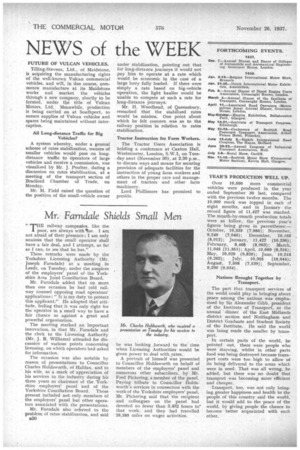Mr. Farndale Shields Small Men
Page 4

If you've noticed an error in this article please click here to report it so we can fix it.
THE railway companies, like the
I poor, are always withIne. I am not afraid of their presence ; I am only anxious that the small operator shall have a fair deal, and I attempt, as far as I can, to see that he has."
These remarks were made by the Yorkshire Licensing Authority (Mr. Joseph Ferndale) at a meeting in Leeds, on Tuesday, under the auspices of the employers' panel of the Yorkshire Area Joint Conciliation Board.
Mr. Ferndale added that on more than one occasion he had told railway counsel opposing road operators' applications : "It is my duty to protect this applicant." He adopted that attitude, feeling that it was only right for the operator in a' small way to have a fair chance as against a great and powerful organization.
The meeting marked an important innovation, in that Mr. Ferndale and the clerk to the Licensing Authority (Mr. J. R. Williams) attended for discussion of various points concerning licensing, on which operators had asked for information.
The occasion was also notable by reason of presentations to Councillor Charles Holdsworth, of Halifax, and to his wife, as a mark of appreciation of his services to the industry during his three years as chairman of the Yorkshire employers' panel and of the Yorkshire Conciliation Board. Those present included not only members of the employers' panel but other operators associated with the presentations.
Mr. Ferndale also referred to the problem of rates stabilieation, and said B20 he was looking forward to the time when Licensing Authorities would be given power to deal with rates.
A portrait of himself was presented to Councillor Holdsworth on behalf of members of the employers' panel and numerous other subscribers, by Mr. Fred Pickering, a member of the panel. Paying tribute to Councillor Holdsworth's services in connection with the work of the Yorkshire employers' panel, Mr. Pickering said that the recipient and colleagues on the panel had devoted no fewer than 3,482 hours to that work, and they had travelled 26,385 miles on wages activities.






























